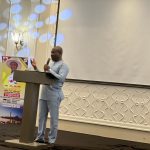Muleme Keeya Isaac an expert lawyer on matters of copyright and intellectual property rights spoke to Frank Ntambi of Monday Times about the concept of copyright and its applicability in Uganda.
Copyright, a form of intellectual property law, protects original works of authorship including literary, dramatic, musical, and artistic works, such as poetry, novels, movies, songs, computer software, and architecture. Copyright does not protect facts, ideas, systems, or methods of operation, although it may protect the way these things are expressed according to Mr Muleme Keeya Isaac, a legal assistant with Kenneth Akampurira Advocates, Solictors & Commissioners for Oaths whom we had a discussion with which went as follows;

Frank Ntambi (in blue tie) interviews Muleme Keeya Isaac
Monday Times (Frank Ntambi): What is the most important distinction in Uganda’s Copyright Law?
Muleme Keeya Isaac :The very first important distinction in copyright law is between the performance and reproduction of musical works. Under the 2006 Copyright Act, to perform means to “recite, render, play, dance or act, either directly or by means of any device or process.” Copyright law is implicated only when the performance is public. For copyright purposes, broadcast of a song over the radio constitutes a public performance. Reproduction and distribution occurs when a copy of a sound recording is made and sold. Record companies engage in reproduction and distribution when they press and distribute CDs or records.
Monday Times (Frank Ntambi): So who owns the Musical Compositions?
Muleme Keeya Isaac: Typically, musical compositions are owned by the songwriter(s) and/or publishers. (Publishers come into the picture when a company such as Warner Tamerlane buys the publishing rights to a song.) For simplicity, I will refer to the owners of musical compositions as the songwriters. Sound recordings, on the other hand, are usually owned by the band as a whole or the record company. For convenience I will refer to the owners of sound recordings as the musicians.

Muleme Keeya Isaac
Monday Times (Frank Ntambi): Who should have the Exclusive rights to a Musical composition then?
Muleme Keeya Isaac: Under current copyright law, the exclusive right to reproduce copyrighted works applies both to musical compositions and to sound recordings. The copyright owner of the musical composition — the songwriters — receives mechanical royalties for the reproduction and distribution of any recording of that composition. For example, Elly Wamala should have received mechanical royalties for all his songs being done, or even Paul Kafero. These mechanicals are administered by publishers who bought the Exclusive rights -the wholly-owned licensing subsidiary of the Uganda Perfoming Rights Society. Similarly, the copyright owner of a sound recording — usually the musicians -receives mechanical royalties for the reproduction and distribution of that recording. However, the exclusive right of public performance of copyrighted works generally applies only to musical compositions, not to sound recordings.
Monday Times (Frank Ntambi): So who is to blame for the failure of the Copyright Law in Uganda especially to the musicians?
Muleme Keeya Isaac : This traditional system of copyright law, which deprives singers and musicians of performance royalties, is rooted in conceptions of copyright law and performance value which pre-date radio and other broadcast media. Performers of classical compositions “were less involved with the creation of music than they are [today]. . . . [T]he vast majority of the creative energy and the musical expression in classical works lies in the written score, where music is meticulously described. Thus, the copyright system once accurately reflected composers’ and performers’ respective roles in the creation of music.
Monday Times (Frank Ntambi): How can artistes protect their work for perpetuity?
Muleme Keeya Isaac 1. Ensure your work is properly marked .A correctly worded notice will deter infringement, as it states that the work is protected under law. Although a copyright notice is not required, (work is automatically subject to copyright protection under law), displaying a notice shows that you have an awareness of copyright and take infringements of your work seriously.
2) Register your work . If your work is infringed and your claim to copyright is disputed (i.e. in a plagiarism case – where the other party claims the work is theirs), you may need evidence to help prove your claim. This valuable evidence can be provided by our copyright registration service that provides verifiable proof of the date and content of your work. As specialists in this area, we ensure that you have the very best evidence to support your rights, while our service policies ensure that the evidence is always available when it.
Lastly: Agreement between co-authors. If your work is a joint venture, be sure you know exactly where you stand, who will own what rights, and what happens when someone leaves. For more details, see our page on agreements between co-authors.





















